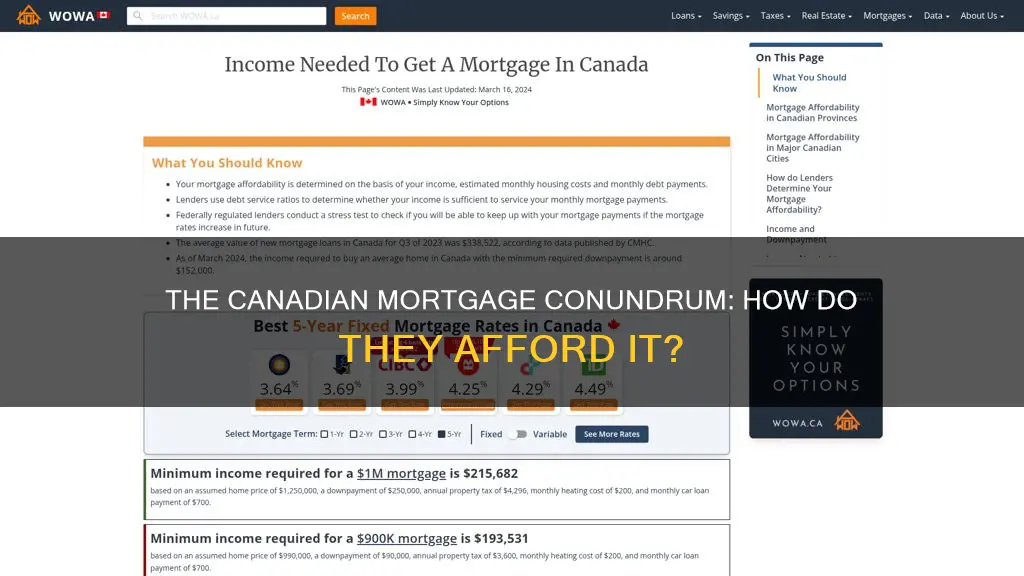
Canadians have a strong desire for homeownership, but with rising housing prices and high mortgage rates, it can be challenging to afford a home. The average home price in Canada has increased significantly in recent years, more than tripling between 2005 and 2022. While there has been some improvement in affordability due to dropping mortgage rates and higher wages, housing affordability remains a significant issue for Canadians, with many struggling to keep up with monthly payments. The gap between what people can comfortably pay and what they are paying has widened, and it is not just low-income earners who are affected. Even high-income earners are feeling the pinch, with many unable to comfortably manage high monthly mortgage payments. So, how do Canadians afford such high mortgages?
What You'll Learn

Homeownership is a priority for Canadians
Homeownership is a priority for many Canadians, but with rising housing prices, navigating the world of mortgages can be challenging. Various factors influence mortgage affordability in Canada, and understanding these factors can help inform decisions about home purchases.
One key factor is the income required to qualify for a mortgage. The amount of income needed is determined by regional real estate data, mortgage rates, and stress test rates. In February 2025, the required income to qualify for a mortgage on an average-priced home decreased in eight out of 13 major markets, providing some relief to homebuyers. However, it's important to consider not only the income required to qualify for a mortgage but also an individual's financial situation and long-term financial stability. Affordability is about more than just securing a home; it's about ensuring that individuals can comfortably manage monthly payments while maintaining a reasonable standard of living.
The cost of homeownership extends beyond the mortgage itself. Property taxes, maintenance, and utilities can significantly impact a homeowner's budget. Additionally, factors such as a minimum credit score of 680 to meet the Gross Debt Service (GDS) and Total Debt Service (TDS) ratio requirements set by mortgage default insurers can influence an individual's ability to obtain a mortgage. These ratios take into account housing costs and other debts to ensure that borrowers can manage their payments.
Canada's ban on foreign buyers has not significantly improved housing affordability for Canadians. High house prices are influenced by the perception of homes as financial assets, with existing homeowners benefiting from rising prices. This dynamic has contributed to the housing affordability crisis, as prices outpace earnings, making it challenging for first-time buyers to enter the market.
Despite the challenges, the Canadian government offers incentives for first-time homebuyers, including a tax credit of up to $10,000. Additionally, mortgages with a deposit of just 5% are available, providing an opportunity for those with high-paying jobs to enter the market. For those unable to afford homes in their chosen markets, saving has become more attractive due to improved interest rates compared to a few years ago.
Jim Dean's Untimely Death: What Happened to Him?
You may want to see also

Rising housing prices
The average cost of a home in Canada has been steadily increasing over the years. According to the Canadian Real Estate Association, the average home price in January 2005 was $241,000, which had increased to $719,400 by February 2024. This has been driven by a variety of factors, including the assumption that homes are a financial asset, increasing demand from investors, and the global appeal of Canadian cities.
Homes as Financial Assets
Paul Kershaw, a public policy professor and affordability advocate, argues that Canadians have been conditioned to view their homes as their greatest financial asset. This mindset contributes to the acceptance of ever-rising home prices and obscures other issues that need to be addressed to reduce housing costs.
Investor Demand
The Bank of Canada found that investors were responsible for 30% of home purchases in the first quarter of 2023. This demand from investors has outpaced the supply of new housing projects, contributing to rising prices.
Global Appeal of Canadian Cities
The success and global pull of major Canadian cities have also contributed to rising housing prices. The strong competition for housing stock in cities like Toronto and Vancouver has driven prices upwards, with the average home price in these cities typically exceeding $1 million.
Impact on Affordability
The rising housing prices have made navigating the world of mortgages more challenging for Canadians. In 2023, Canadian households allocated up to 63.8% of their income to cover mortgage payments, property taxes, and utilities, far exceeding the recommended range of 30% to 32%. Even high-income earners are feeling the pinch, with many unable to comfortably manage monthly payments above a certain threshold.
To improve affordability, the Canadian government has introduced incentives for first-time home buyers, including a tax credit of up to $10,000. Additionally, lower interest rates and improved savings rates during the pandemic have provided some relief. However, the gap between what people can comfortably pay and the actual mortgage costs continues to widen, indicating a persistent housing affordability crisis in Canada.
Avoiding Mortgage Crisis: Strategies for Stability and Security
You may want to see also

High mortgage rates
Canada's housing market is extremely competitive, with high demand and rising prices. This demand is fuelled by a combination of native buyers and a large number of immigrants, with almost a quarter of a million people immigrating to Canada each year. The assumption that homes are a financial asset has also contributed to the high prices.
Mortgage rates in Canada are influenced by various factors, including interest rates, income levels, and government policies. In recent years, Canada's policy interest rate has fluctuated, rising to 5% in July 2023, impacting the affordability of mortgages. Additionally, income levels have not kept up with rising housing costs, with ownership costs consuming a significant portion of the median household income.
The required income to qualify for a mortgage on an average-priced home is calculated using regional real estate data, mortgage rates, and stress test rates. The lower the mortgage rate, the lower the required income, making it more affordable for buyers. However, high house prices in major cities like Toronto and Vancouver require buyers to have above-average incomes or strong deposits.
To assess mortgage affordability, Canadians can use tools like the MoneySense mortgage affordability calculator, which takes into account factors such as income, mortgage rates, and stress test rates. It's important for buyers to consider their long-term financial stability and factor in potential future expenses like maintenance and property taxes when deciding on a mortgage.
While the Bank of Canada is unlikely to raise the policy interest rate significantly, it is crucial for individuals to carefully evaluate their financial situation and seek expert advice before taking on a mortgage to ensure they can afford the long-term commitment.
Subprime Mortgages: Catalyst of the Global Financial Crisis
You may want to see also

Income vs housing costs
Canadians have a strong desire for homeownership, but rising housing prices and high mortgage rates have made it challenging for many. The average home price in Canada has increased significantly over the years, more than tripling between 2005 and 2022, and this trend has continued into 2024 and 2025. This has resulted in a housing affordability crisis, with homeownership becoming out of reach for a growing number of Canadians.
Income has failed to keep up with the rapid rise in housing costs. In 2023, the ownership costs of an average home in Canada consumed more than 60% of the median household income. This is well above the recommended range, as ideally, only 30% to 32% of a household's gross annual income should go towards housing costs, according to the Royal Bank of Canada (RBC). Even high-income earners are feeling the strain, with many unable to comfortably manage monthly payments above a certain threshold.
The gap between income and housing costs has widened, and it is not just low-income Canadians who are affected. This disparity is influenced by various factors, including the assumption that homes are a financial asset, leading to a focus on increasing home prices rather than addressing affordability. Additionally, Canada's ban on foreign buyers has not improved affordability, and investors have contributed significantly to the demand for homes, further driving up prices.
To navigate the world of mortgages and secure affordable housing, Canadians must consider their financial situation and make realistic assessments. While lower interest rates and higher wages have provided some relief, the impact of increased wages is expected to diminish over time. Affordability varies across different markets in Canada, with cities like Toronto and Vancouver requiring above-average incomes or substantial deposits due to high housing prices.
To improve affordability, the Canadian government has introduced incentives for first-time home buyers, including a tax credit of up to $10,000. However, the upcoming federal budget is expected to include additional measures to address the housing shortage and affordability crisis.
Mortgage Pre-Approval: What Can I Afford?
You may want to see also

Investors buying homes
Canada's real estate market is open to foreign buyers, including Americans, who can buy a home or invest in business without becoming permanent residents. Many foreign investors choose to buy homes in Canada for rental income, such as vacation homes, resale homes, or long-term capital gains. The average purchase price of real estate in Canada is around CAD $716,828, but this varies depending on location, with metropolitan areas like Toronto, Vancouver, and Montreal commanding higher prices due to their urban amenities, economic opportunities, and cultural offerings.
In recent years, the federal government has targeted corporate investors buying single-family homes, seeking to curb the purchase of these homes by "very large corporate investors." This move comes amid concerns about the impact of investors on the availability and affordability of housing for Canadian residents.
While investors may be attracted to Canada's stable and welcoming environment for international buyers, it is important to be mindful of the potential impact on local communities and to navigate the rules and procedures to ensure a smooth and legally sound transaction.
Additionally, investors should consider the financial implications, including potential future expenses like maintenance and property taxes, as well as the impact of interest rates on mortgage affordability. Seeking guidance from a mortgage professional can help investors make informed decisions and find suitable mortgage products.
The Mortgage Industry: A Giant in the Financial World
You may want to see also
Frequently asked questions
Canadians' deep-rooted desire for homeownership, viewing homes as financial assets, and the government's focus on ensuring citizens' readiness to buy homes have contributed to high mortgage affordability. However, it's essential to assess one's financial situation and consider long-term financial stability when making such significant decisions.
Canadians' incomes, savings, and credit scores impact their ability to afford high mortgages. Additionally, the mortgage interest rate, housing market conditions, and government incentives like tax credits for first-time home buyers also play a role.
Canadians struggle with rising housing prices, high rates, and the potential risk of falling behind on mortgage payments. The gap between what people can comfortably pay and the actual mortgage costs has widened, impacting not just low-income earners but also high-income households.







